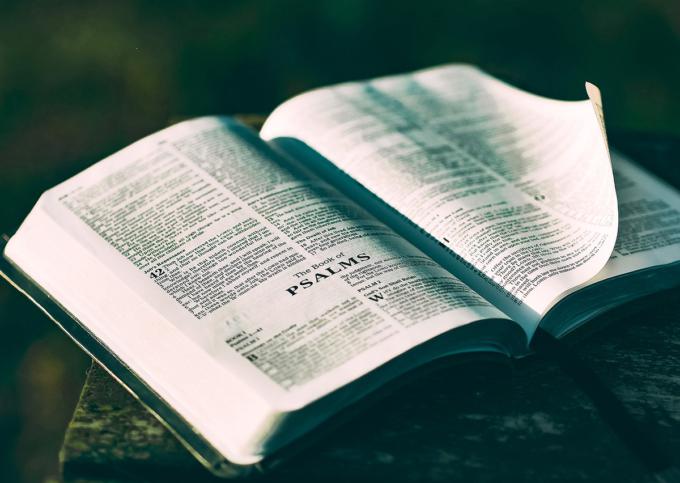
Faith
Sadly, praise is not a common or well-understood practice in the church today.

Wolfe
Election year language often involves mudslinging, name-calling, taunts, and insinuations. We say we want our politicians to tell us their policies and proposals. We complain that they hardly ever articulate what they intend to do if they are elected, their positive vision for our country. But there's no denying that negative ads are more effective than positive ones when it comes to influencing voters.
There's an unfortunate side effect of listening to labels and slurs for weeks on end. The steady diet of contempt draws us downward. And as a result, we become less civil, more coarse, irritated, and agitated. All that negativity makes us negative. And while turning off the news can help, our faith gives us a sure weapon against negativity and hopelessness -- the prayer we call "praise."
Sadly, praise is not a common or well-understood practice in the church today. Catholics intent on practicing the faith go to Sunday Mass. Nearly all are familiar with devotional prayers like the rosary or the Divine Mercy Chaplet. More laypeople have joined the clergy and religious in regularly praying at least some of the Liturgy of the Hours. And thanks to the national eucharistic revival, a growing number have experienced adoration of the Most Blessed Sacrament. All these things are good. But prayer without praise is not all it could -- or should -- be.
God, of course, doesn't need us to tell him how wonderful he is, but it is evident that we do. What's missing from our Christian lives, including the depth of discipleship we seek, may well be rooted in our lack of praise. Consider what the Scriptures teach us.
The book of Psalms reminds us that we "enter his gates with thanksgiving and come into his courts with praise" (Ps 100:4). Praise ushers us into the presence of God and changes the inner atmosphere of the soul. So many of us go through life wondering where God is, unable to connect with him even though he is with us.
As bearers of his divine image, we belong to God in a special way. "For you created my inmost being; you knit me together in my mother's womb. I praise you because I am fearfully and wonderfully made; your works are wonderful, I know that full well" (Ps 139:13-14). Praise fosters humility before God. And that gives rise to praise.
Praising God lifts us out of whatever pit we're in, whether it's politically induced or not. "Why, my soul, are you downcast? Why so disturbed within me? Put your hope in God, for I will yet praise him, my Savior and my God" (Ps 42:11). Acknowledging who God is gives us hope.
Praise opens our hearts to receive God's grace. When we praise God, we prepare ourselves for whatever gifts he wants to give us. "Heal me, Lord, and I will be healed; save me and I will be saved, for you are the one I praise" (Jer 17:14).
Praise also fulfills our purpose and the purpose of all creation. Our creator did not make us for ourselves. When we recognize that we are created to bring him glory, the meaning of all life becomes clear. "Let everything that has breath praise the Lord (Ps 150:6).
And praise unites us more closely with the angels and saints in heaven as they praise God continuously.
"Then I heard every creature in heaven and on earth and under the earth and on the sea, and all that is in them, saying: 'To him who sits on the throne and to the Lamb be praise and honor and glory and power, for ever and ever!'" (Rev 5:13).
In the 1970s and 80s, the Catholic Charismatic Renewal reignited praise in the church. Those fires have largely died down, but the embers are still glowing. If we want to see a fresh outpouring of God's Holy Spirit, we will once again rediscover how to praise God. The Glory and the Holy, Holy we pray at Mass give us a place to begin. And once we do, we will understand what the Scriptures have been telling us for more than 2,000 years: "Happy are those who live in your house, ever singing your praise. Happy are those whose strength is in you, in whose heart are the highways to Zion" (Ps 84:4-5).
- Jaymie Stuart Wolfe is a Catholic convert, wife, and mother of eight. Inspired by the spirituality of St. Francis de Sales, she is an author, speaker, and musician, and provides freelance editorial services to numerous publishers and authors as the principal of One More Basket. Find Jaymie on Facebook or follow her on Twitter @YouFeedThem.
Recent articles in the Faith & Family section
-
Our Lady of DeliveranceJaymie Stuart Wolfe
-
The 'month of the dead' brings its own strange refreshmentBishop Robert Reed
-
Make New Friends, But Keep the OldMaureen Crowley Heil
-
A royal truthScott Hahn
-
St. Cecilia and hope in sacred songRichard Clark


















